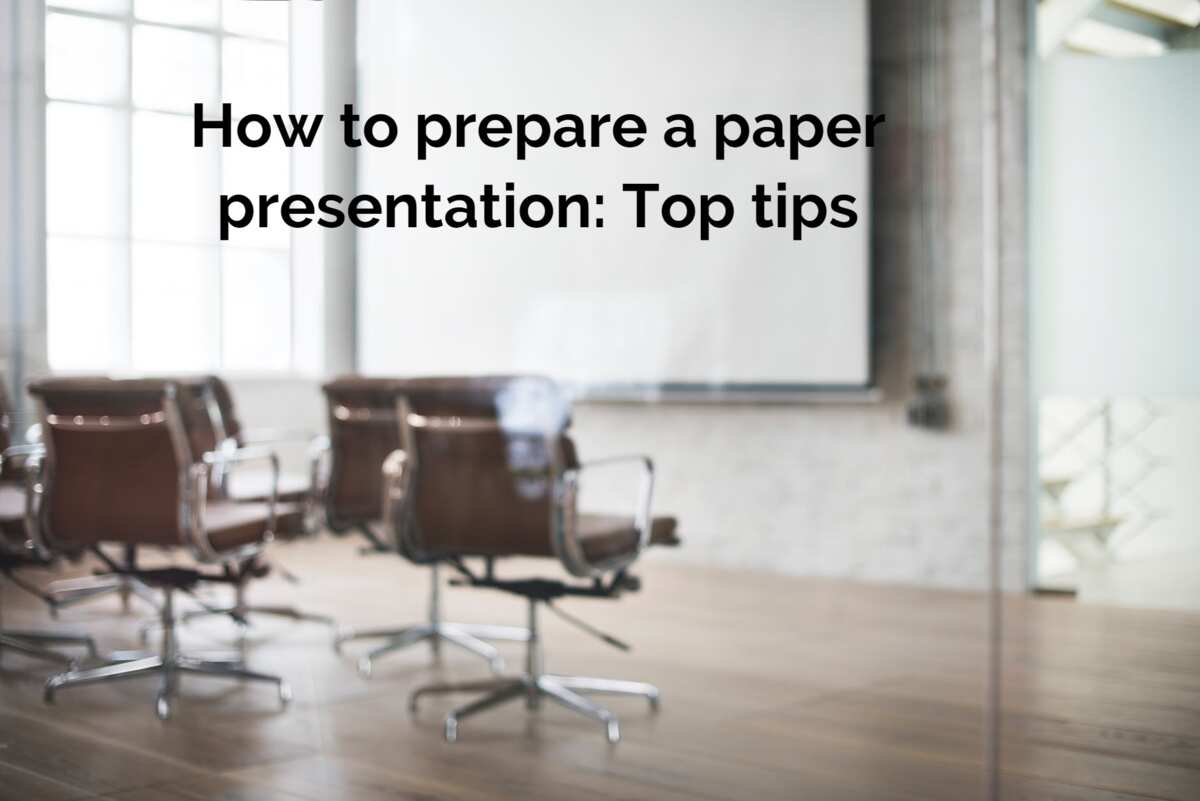If you are interested in creating a perfect paper presentation, you are in the right place. Sometimes your career or even your reputation may depend on how successful your performance is. And we can teach you how to make a successful paper presentation. Our tips can help you to organise the whole process without any worry.

Image: pexels.com (modified by author)
Source: UGC
Sometimes you may need to present the work you have done. And very often, showing the work is not enough, because you have not only to show all you have got but to you have to present it correctly. As a rule, such presentations bring a lot of stress to the speaker, because usually, there are a lot of people, listening to you, whom you may not even know, and the result of your work depends on their opinion as well.
Of course, such situations make you worry. But have you ever noticed that the better you prepare, the less you worry and even the more positive results you get at the end? Take into consideration some tips for creating a perfect paper presentation, and you will never think of failure or worrying again.
How to prepare a paper presentation: Top tips

Image: pexels.com
Source: UGC
Try to write down these tips and use them in case you have to make a paper presentation. We can call these little tips - the key to success.
Learn all the information from organisers
Usually, we create presentations for some occasion. It may be something like a conference or meeting, etc. And any event has its own rules called “the call for papers”. If you read it correctly, you will understand what you may need to do, and that may seriously simplify your whole work. For example, you may find out how long your presentation should be, is there any time for questions after it and so on.
In most cases, the whole presentation takes from 10 to 20 minutes for your general speech and 5 minutes for talking to the audience, questions and so on. But who knows, maybe the occasion, where you are going to perform has its own rules, where you have to make an hour speech and then answer the questions for 10 hours, right? That is why it is so important to learn all the aspects of the call for papers. As a plus, in this way, you show respect for the owners of the occasion, and it will always give you some extra points.
Planning
How often do you hear that planning is the key to everything? All of us know that it is good to plan everything. We have to plan our day, our week, our year, our life. It is very popular to have a planner, where you are writing all the tasks you have to do in a day, for example. If you have ever tried it, you probably know that it works. It works the same way with the paper presentations.
If you have no clear image of what you are going to do with your paper, you will not succeed, agree? Plus, during the speech, there is always not enough time for discussing all the things you have in your writing. That is why you have to plan it from the beginning to the very end. Try to choose some topics or research questions and focus on them. Your audience should understand what you are talking about. Try to make it clear. Create a clear structure and stick to it. Also, do not forget to summarise each aspect, which you were paying attention to.
Write the paper
In this case, you have to imagine that you have some limits in words. It means that it is excellent to make a summary of your whole work. You may think that it is a weird idea. Why should you write an enormous task and then make a mini version of it? The answer is simple. It helps you to avoid the mess while doing the presentation itself. When you make this mini version of your work, you choose the main facts and aspects.
Choose what is best for you
It is okay if you always doubt whether this or that scheme will work. And if you have some extra time, you may think of a few variations of your paper presentation. Yes, it may seem tedious and useless, but it also works.
Usually, we create something, make a short paper presentation according to the requirements and hope that all this is going to work. But there is one little thing you can do to keep the success closer. All you have to do is try to think of 2 or 3 different ways to present your work. It allows you to see what looks better, what sounds better, which one includes the best information and so on. It is not that hard, but it leads you to a positive result.
Practice with your family or friends

Image: pexels.com
Source: UGC
READ ALSO: How to answer reason for job change?
You have done everything. You have created the work, you have made a few paper presentations, you have chosen the one, which seems the best. What is next? Now it is time to prepare for the speech. Take your papers, go to your mother, sister, friend, boyfriend or girlfriend and rehearse your presentation with them.
It is an excellent way to be prepared. Yes, you feel very comfortable with your close people, and it is difficult to focus on something serious, but you have to try. Also, after practising in front of your family or friends, you can look through the whole presentation once again, and that is how you may notice any mistakes or some facts, which you need to replace with something different and so on.
Start your day with positive energy
Now, we are getting closer to the day X. Make your morning beautiful. Wake up, listen to music, make your mind and body relax, eat your favourite food and so on. All that may give you the positive energy, and it is essential because you are going to spread this energy into the audience. And the audience always feels that.
Also, try to get to the place of “action” just 5 minutes earlier. You will “absorb” the atmosphere before the start plus, you may communicate with other participants. It may help you relax as well.
Be ready for questions
It is great when you are prepared with your paper presentation, and you have planned each aspect of it, you have the mini version with you, and you are ready to present it, everything is under control. But there is one thing you cannot control. It is the audience. You are not able to choose their mood, their reaction and of course their questions.
You will never know what questions your audience may ask, but do not be afraid of it. No one is going to ask you something out of the topic. And if you are ready with your work, you will not have problems with the questions. Always remember that you can ask to rephrase an issue if you did not get something and there is nothing wrong with that. There is still nothing wrong if you cannot answer the question at all. You do not have to lie or make some silly jokes. Be honest with the audience. Tell them that you have not looked at this issue yet and will keep it in mind for the future.
Enjoy!
Always remember that no matter if something goes wrong. Do not take any little failure that much serious. Even if you said something wrong, half of the audience would not even hear that and the other half will forget about it in 5 minutes after the presentation.
The most important is your mood and your inner feeling. As we said before, the audience feels your energy. So, do not think of failure and do not be afraid of something. Be honest, spread positive energy, be prepared and take it easy.
We are sure that these tips will help you in making a perfect paper presentation. Always keep them in mind and use them in your life. Try to use them next time when writing a paper presentation.
READ ALSO: Top tips on how to describe yourself at a job interview
Source: Legit.ng
from Nigeria News today & Breaking Naija news ▷ Read on Legit.ng 24/7 https://ift.tt/2Cfntr5
via EDUPEDIA24/7
Comments
Post a Comment